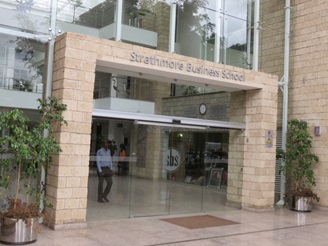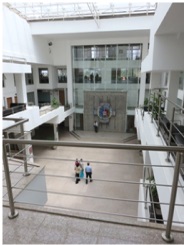Following a recent post by Mary Mutinda and Mercy Kano, here is a further report of work taking place at Strathmore University which is one of the leading HE institutions in work on social economy in Kenya.
 Simon is a lecturer in Economics and Agribusiness. He teaches economics on MBA at Strathmore University. The Strathmore Business School (SBS) is divided up into executive programmes and post-graduate programmes. They hope to have a Masters programme in agribusiness in the near future. Simon sets the following examples against a backdrop of the urgent need for Kenya to improve its agricultural production in order to stave off famine and improve the economy. He sees this as an important contribution to the social economy and believes that the university has a role in solving the problems of society. He has been involved in special projects concerned with agribusiness which he describes below.
Simon is a lecturer in Economics and Agribusiness. He teaches economics on MBA at Strathmore University. The Strathmore Business School (SBS) is divided up into executive programmes and post-graduate programmes. They hope to have a Masters programme in agribusiness in the near future. Simon sets the following examples against a backdrop of the urgent need for Kenya to improve its agricultural production in order to stave off famine and improve the economy. He sees this as an important contribution to the social economy and believes that the university has a role in solving the problems of society. He has been involved in special projects concerned with agribusiness which he describes below.
Last year they carried out two programmes. The first one was coffee business and what interested them was looking to solve the current crisis in the coffee industry. In spite of Kenya’s tradition as a world leader in coffee growing, coffee trees are being cut down and they asked themselves in the business school what they could do to reverse the behaviour. They brought together all the stakeholders in the coffee sector to address the problem (about 25 participants). A major problem is the cartels get all the profits and the farmers are getting very little. This led to fruitful discussions between all the parties concerned. The governor of Nyeri and the head of the coffee board attended. As a result, local leaders are encouraging the farmers not to cut down their trees, there is a greater emphasis on marketing and farmers are being encouraged to cut out the ‘middle man’.
 In the second example, as part of a programme ‘Investing in Agribusiness’, they brought together ‘telephone farmers’ ie those city dwellers with their main source of employment in the city but who own land in the rural areas and employ others to run the farms for them. The SBS realised that this group of people do not have a forum or way of engaging with their fellow farmers. They brought together the telephone farmers (again about 25 participants) and those working on the land. They had three days in the classroom, the telephone farmers and other farmers working together, and another three days in the field. They got ‘hands-on’ experience of how the farm work was done.
In the second example, as part of a programme ‘Investing in Agribusiness’, they brought together ‘telephone farmers’ ie those city dwellers with their main source of employment in the city but who own land in the rural areas and employ others to run the farms for them. The SBS realised that this group of people do not have a forum or way of engaging with their fellow farmers. They brought together the telephone farmers (again about 25 participants) and those working on the land. They had three days in the classroom, the telephone farmers and other farmers working together, and another three days in the field. They got ‘hands-on’ experience of how the farm work was done.
It is hoped that such initiatives will be linked to the new Masters programme in the future.
Many thanks to Dr Simon Wagura Ndiritu who was interviewed by Mike Calvert on a recent visit to Kenya as part of the Social Economy in Higher Education project